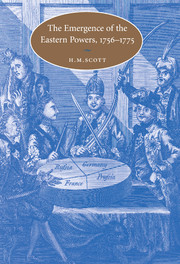Book contents
- Frontmatter
- Contents
- List of maps and genealogical table
- Acknowledgements
- A note on dates and place names
- List of abbreviations
- Introduction: the eighteenth-century European states system and its transformations
- 1 The rise of the eastern powers
- 2 The Seven Years War and the European states system
- 3 The domestic legacies of the Seven Years War
- 4 The stabilisation of Europe, 1763–1766
- 5 Diplomacy and the eastern powers
- 6 From peace to war, 1766–1768
- 7 The partition of Europe, 1768–1772
- 8 The advance of Russia, 1772–1775
- Conclusion: Russia and the emergence of the eastern powers
- Bibliography
- Index
- CAMBRIDGE STUDIES IN EARLY MODERN HISTORY
6 - From peace to war, 1766–1768
Published online by Cambridge University Press: 16 July 2009
- Frontmatter
- Contents
- List of maps and genealogical table
- Acknowledgements
- A note on dates and place names
- List of abbreviations
- Introduction: the eighteenth-century European states system and its transformations
- 1 The rise of the eastern powers
- 2 The Seven Years War and the European states system
- 3 The domestic legacies of the Seven Years War
- 4 The stabilisation of Europe, 1763–1766
- 5 Diplomacy and the eastern powers
- 6 From peace to war, 1766–1768
- 7 The partition of Europe, 1768–1772
- 8 The advance of Russia, 1772–1775
- Conclusion: Russia and the emergence of the eastern powers
- Bibliography
- Index
- CAMBRIDGE STUDIES IN EARLY MODERN HISTORY
Summary
In the summer of 1766 Prussia's representative in Vienna, Rohde, left on leave. Shortly before his departure, Kaunitz went out of his way, in a rare extended conversation, to highlight the friendly relations between the former adversaries and to stress Austria's wish that these should continue, sentiments which were endorsed by Maria Theresa in the envoy's formal leave-taking audience. There was more than diplomatic form to these reassurances, which were fully justified in view of the untroubled state of Prusso-Austrian relations and, in a wider sense, of continental politics three years after the Peace of Hubertusburg. Though the Bourbon powers periodically clashed with Britain, these confrontations were minor and confined to the colonial sphere, and they appeared unlikely to bring on a new war. Within Europe, there appeared no obvious threat to peace and stability in mid–1766, and everywhere governments continued the tasks of reconstruction and reform, resumed after the peaceful election of a new Polish King.
Rohde's departure was the latest episode in a prolonged squabble with the tightfisted Prussian King over pay arrears and inadequate expenses. In late January the envoy had submitted a semi-ultimatum: if he were not to be recalled outright, he demanded either an increase in pay and expenses – and for these actually to be paid – or five months' leave in order to return to East Prussia to attend to family affairs.
- Type
- Chapter
- Information
- The Emergence of the Eastern Powers, 1756–1775 , pp. 162 - 186Publisher: Cambridge University PressPrint publication year: 2001

